You have /5 articles left.
Sign up for a free account or log in.

Gerasimov174/iStock/Getty Images Plus
Late-2023 breaking news: plagiarism had been found in Harvard president Claudine Gay’s dissertation and some scholarly publications. The reactive rhetoric vacillates between dismissing the plagiarism as a smear campaign against Harvard’s first Black female president (which is part of a larger campaign to discredit higher education institutions) and acknowledging that presidential plagiarism must be addressed because it undermines public trust in higher education. Debates swirl about whether the evidence really suggested plagiarism or “sloppy authorship” and whether it even really matters.
To be sure, it is obviously very easy to plagiarize (that is, to use another’s ideas or words without attribution or without appropriate/standard citation practices). It doesn’t take intent like arranging for another (human or machine) to write your dissertation for you (and yes, this does happen for dissertations, and for articles and books, too). Plagiarism can be intentional, but it can also just be a result of sloppy research, poor note taking and carelessness. It can, in other words, be a mistake.
Yet the cause of the plagiarism is irrelevant if its mere existence can be career ending for academics and researchers and scandal producing for institutions. So, as the Gay “scandal” unfolded, universities started considering a post hoc solution of having search firms check for plagiarism before hiring academic leaders.
This is a too little, too late approach.
We should just check for plagiarism before dissertations are approved, degrees are granted or manuscripts are published. After all, it’s just as easy to detect plagiarism as it is to do it, and most institutions already use similarity-detection tools to detect plagiarism in unpublished academic work by undergraduate students. Yet it appears that these same tools are not regularly used to check for plagiarism in work produced by graduate students, postdoctoral scholars or faculty.
So why don’t we?
I’ll share with you the reasons I’ve heard in my 20-plus years working in academic integrity—as a researcher, author, practitioner and consultant—and then I’ll end with some practical suggestions for remedy.
First, there seems to be a systemic hubris in American higher education institutions—an unfounded self-confidence that our scholars do not plagiarize, contract cheat or engage in other forms of misconduct, and therefore we need not check to ensure they haven’t. Hubris has been known to infect the upper echelons of organizations, causing leaders to ignore the ethical dimensions of situations in which they are involved: the typical “rules for thee, but not for me” hubris. This hubris may be why institutions are so comfortable checking the work of undergraduates but not the work of doctoral students, researchers or faculty.
There’s also individual ego. American professors expend a lot of energy on their doctoral students. Perhaps the doctoral students even become an extension of self. And since I don’t see myself as capable of plagiarizing, I don’t see my doctoral students as capable of it, either. So, to protect my ego, I go with the ignorance-is-bliss approach—if I don’t look for it, I’ll never find it. This is, of course, denialism, and it doesn’t seem to be serving our scholars or our institutions well.
This brings us to the political dimension of the problem. Relationships among doctoral students and faculty, and within the faculty itself, are complex and intertwined. The graduate student in your class is my research assistant, and my research assistant is another’s teaching assistant. Connected with ego, when one professor levels a plagiarism accusation against another professor’s advisee, it is often not well received and can cause real divisions within a department. The same can be said for identifying plagiarism by postdoctoral scholars and professors; it’s not a fun topic for departmental conversation.
I’ve also routinely heard the “I’m an educator, not a police officer” refrain to argue why we shouldn’t detect plagiarism or misconduct by our students. I heard this before the existence of remote proctoring and artificial intelligence content detectors, but now it’s loudly attached to the anti–detection technology rhetoric: the technology is evil because it is not 100 percent perfect and false accusations cause harm. That’s nonsense. The mere detection is not what causes harm, and our use of technology does not force us to become police officers. We have agency in how we use these tools and what we do after we detect. I argue that we can figure out how to use technology to educate students and prevent scholars and academic leaders from engaging—perhaps inadvertently—in career-ending moves.
And finally, there is a new 2024 argument: plagiarism is an antiquated concept, an anachronism from another era. Deliberating what is and isn’t plagiarism is certainly needed given the new challenges wrought by generative AI. But clearly plagiarism has some currency in contemporary society as a method for taking down scholars or embarrassing institutions. So we should still care about it if, for no other reason, to prevent its weaponization. But I would argue that we should still care about our students’ and our scholars’ ability to be thoughtfully critical and transparent about where their ideas and words come from. We should still care about being able to trace another person’s sources to verify their veracity. And we should still care about respecting others’ contributions to our own thinking.
Despite the rationalizations for failing to detect and prevent plagiarism in previously published dissertations and other scholarly works, the fact remains that scholars are responsible for ensuring the integrity of their work. And it’s not just the authors with that responsibility. Institutions share it, especially when the authors are students and institutions certify their work.
This brings us back full circle to the Gay scandal—a scandal that could have been prevented by using available technology to detect plagiarism before the works were published. To be sure, current detection technology did not exist when Gay completed her dissertation in 1997. But today, doctoral program dissertation committees could require dissertations to be run through similarity-detection software to identify and fix any plagiarism before the committee’s review. For many institutions, they already have the software to check undergraduate students’ work, so this prevention strategy wouldn’t even incur a monetary cost. Likewise, for publications (e.g., journal articles), institutions or publishers can use the appropriate technology to check and correct a text before they publish it (or, from the journal’s perspective, decline to publish it). What a shame this isn’t done more routinely these days. The harm caused—to both individual scholars and institutions—when plagiarism is exposed after the fact can be easily and painlessly prevented.
Students and scholars are human beings who can make mistakes, and technology exists that can help us prevent those mistakes from metastasizing into scandals or more egregious errors. All higher education institutions, especially research institutions, should enact policies that require doctoral dissertations to be checked for plagiarism before the final defense. Institutions should provide the technology necessary to do that, and their policies should specify the appropriate remedy for any identified issues (e.g., allowing the student to fix errors). Institutions should also ensure that faculty members and other researchers can use similarity detectors to check their work before sending it out for review or publication, so they have a chance to revise if needed. These suggestions certainly don’t address all research-integrity violations that could occur, but as they say, low-hanging fruit is the easiest to pick, so why not start there?








